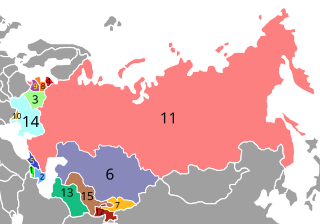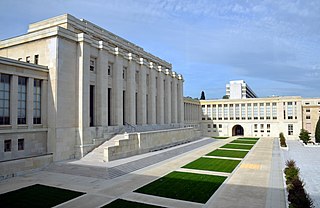Related Research Articles

Belarus, officially the Republic of Belarus, is a landlocked country in Eastern Europe. It is bordered by Russia to the east and northeast, Ukraine to the south, Poland to the west, and Lithuania and Latvia to the northwest. Belarus spans an area of 207,600 square kilometres (80,200 sq mi) with a population of 9.1 million. The country has a hemiboreal climate and is administratively divided into six regions. Minsk is the capital and largest city; it is administered separately as a city with special status.

The foreign relations of Laos, internationally designated by its official name as the Lao People's Democratic Republic, after the takeover by the Pathet Lao in December 1975, were characterized by a hostile posture toward the West, with the government of the Lao People's Democratic Republic aligning itself with the Soviet bloc, maintaining close ties with the Soviet Union and depending heavily on the Soviets for most of its foreign assistance. Laos also maintained a "special relationship" with Vietnam and formalized a 1977 treaty of friendship and cooperation that created tensions with China.

Perestroika was a political reform movement within the Communist Party of the Soviet Union (CPSU) during the late 1980s, widely associated with CPSU general secretary Mikhail Gorbachev and his glasnost policy reform. The literal meaning of perestroika is "restructuring", referring to the restructuring of the political economy of the Soviet Union, in an attempt to end the Era of Stagnation.

Ukraine is a country in Eastern Europe. It is the second-largest European country after Russia, which borders it to the east and northeast. It also borders Belarus to the north; Poland and Slovakia to the west; Hungary, Romania and Moldova to the southwest; with a coastline along the Black Sea and the Sea of Azov to the south and southeast. Kyiv is the nation's capital and largest city, followed by Kharkiv, Dnipro, and Odesa. Ukraine's official language is Ukrainian.

The United Nations Economic and Social Council (ECOSOC) is one of the six principal organs of the United Nations, responsible for coordinating the economic and social fields of the organization, specifically in regards to the fifteen specialized agencies, the eight functional commissions, and the five regional commissions under its jurisdiction.

The United Nations Economic Commission for Europe is one of the five regional commissions under the jurisdiction of the United Nations Economic and Social Council. It was established in order to promote economic cooperation and integration among its member states.

The World Federation of Trade Unions (WFTU) is an international federation of trade unions established in 1945. Founded in the immediate aftermath of World War Two, the organization built on the pre-war legacy of the International Federation of Trade Unions as a single structure for trade unions world-wide, following the World Trade Union Conference in London, United Kingdom.
AIESEC is an international "youth-run" and led, non-governmental and not-for-profit organization that provides young people with business development internships. The organization focuses on empowering young people to make a progressive social impact. The AIESEC network includes approximately 40,000 members in 120+ countries.
In international economic relations and international politics, most favoured nation (MFN) is a status or level of treatment accorded by one state to another in international trade. The term means the country which is the recipient of this treatment must nominally receive equal trade advantages as the "most favoured nation" by the country granting such treatment. In effect, a country that has been accorded MFN status may not be treated less advantageously than any other country with MFN status by the promising country.
A supranational union is a type of international organization and political union that is empowered to directly exercise some of the powers and functions otherwise reserved to states. A supranational organization involves a greater transfer of or limitation of state sovereignty than other kinds of international organizations.

The economy of Africa consists of the trade, industry, agriculture, and human resources of the continent. As of 2019, approximately 1.3 billion people were living in 53 countries in Africa. Africa is a resource-rich continent. Recent growth has been due to growth in sales, commodities, services, and manufacturing. West Africa, East Africa, Central Africa and Southern Africa in particular, are expected to reach a combined GDP of $29 trillion by 2050.

The economy of Europe comprises about 748 million people in 50 countries.

The post-Soviet states, also referred to as the former Soviet Union (FSU) or the former Soviet republics, are the independent sovereign states that emerged/re-emerged from the dissolution of the Soviet Union in 1991. Prior to their independence, they existed as Union Republics, which were the top-level constituents of the Soviet Union. There are 15 post-Soviet states in total: Armenia, Azerbaijan, Belarus, Estonia, Georgia, Kazakhstan, Kyrgyzstan, Latvia, Lithuania, Moldova, Russia, Tajikistan, Turkmenistan, Ukraine, and Uzbekistan. Each of these countries succeeded their respective Union Republics: the Armenian SSR, the Azerbaijan SSR, the Byelorussian SSR, the Estonian SSR, the Georgian SSR, the Kazakh SSR, the Kirghiz SSR, the Latvian SSR, the Lithuanian SSR, the Moldavian SSR, the Russian SFSR, the Tajik SSR, the Turkmen SSR, the Ukrainian SSR, and the Uzbek SSR. In Russia, the term "near abroad" is sometimes used to refer to the post-Soviet states other than Russia.

The United Nations Office at Geneva in Geneva, Switzerland, is one of the four major offices of the United Nations where numerous different UN agencies have a joint presence. The main UNOG administrative offices are located inside the Palais des Nations complex, which was originally constructed for the League of Nations between 1929 and 1938.

An international organization, also known as an intergovernmental organization or an international institution, is an organization that is established by a treaty or other type of instrument governed by international law and possesses its own legal personality, such as the United Nations, the World Health Organization, International Union for Conservation of Nature, and BRICS. International organizations are composed of primarily member states, but may also include other entities, such as other international organizations, firms, and nongovernmental organizations. Additionally, entities may hold observer status.
Canada is a member of various international organizations and forums. Canada was a founding member of the United Nations in 1945 and formed the North American Aerospace Defense Command together with the United States in 1958. The country has membership in the World Trade Organization, the Five Eyes, the G7 and the Organisation for Economic Co-operation and Development (OECD). The country joined the Organization of American States (OAS) in 1990, and seeks to expand its ties to Pacific Rim economies through membership in the Asia-Pacific Economic Cooperation forum (APEC). Canada ratified the Universal Declaration of Human Rights in 1948, and seven principal UN human rights conventions and covenants since then. As of 2023, Canada is a signatory to 15 free trade agreements with 51 different countries, and has diplomatic and consular offices in over 270 locations in approximately 180 countries.
International Association of Democratic Lawyers (IADL) is an international organization of left-wing and progressive jurists' associations with sections and members in 50 countries and territories. Along with facilitating contact and exchange of views between and among lawyers and lawyers' associations of all countries, the IADL works to conduct research on legal issues affecting human, political and economic rights, organizes international commissions of enquiry and conferences on legal and judicial concerns, and takes part in international legal observer missions. Through its activities the Association works as a recognized consultative organization with the United Nations through ECOSOC, UNESCO and UNICEF.

The economy of the Soviet Union was based on state ownership of the means of production, collective farming, and industrial manufacturing. An administrative-command system managed a distinctive form of central planning. The Soviet economy was second only to the United States and was characterized by state control of investment, prices, a dependence on natural resources, lack of consumer goods, little foreign trade, public ownership of industrial assets, macroeconomic stability, low unemployment and high job security.
References
- ↑ "IUE today". www.iuecon.org. Retrieved 2022-11-16.
- ↑ Affairs, Department of Economic and Social (2022-01-13). World Economic Situation and Prospects 2022. United Nations. ISBN 978-92-1-001183-9.
- ↑ "International Union of Economists (IUE) | Corporate NGO partnerships". www.globalhand.org. Retrieved 2022-11-16.
- ↑ Kvint, Vladimir L.; Bodrunov, Sergey D. (2022-11-11). Strategizing Societal Transformation: Knowledge, Technologies, and Noonomy. CRC Press. ISBN 978-1-000-82745-3.
- ↑ "International Union of Economists | UIA Yearbook Profile | Union of International Associations". uia.org. Retrieved 2022-11-16.
- ↑ List of Non-governmental Organizations in Consultative Status with the Economic and Social Council as at 31 July 1999. UN. 1999. p. 3.
- ↑ New Times International. New Times Publishing House. 1992.
- ↑ Campbell, Robert (2012-08-21). A Biographical Dictionary of Russian and Soviet Economists. Routledge. ISBN 978-1-136-27826-6.
- ↑ Nations, Food and Agriculture Organization of the United (2020-06-01). Review of agricultural trade policies in post-Soviet countries 2017–2018. Food & Agriculture Org. ISBN 978-92-5-132856-9.